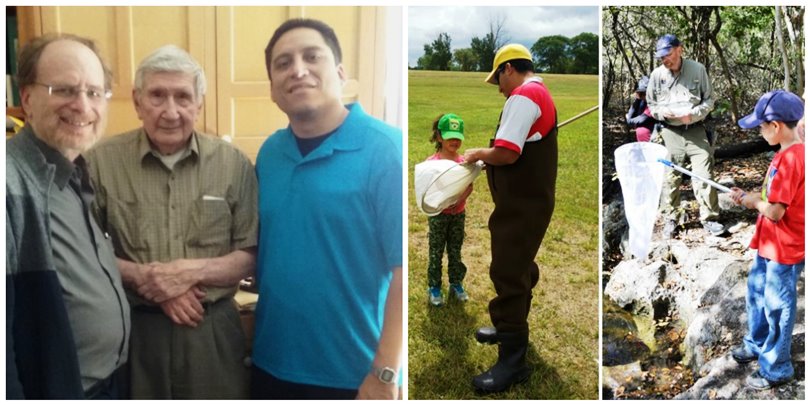
Pictured, from left are Jeffrey Ram, Ph.D., David Cook, Ph.D., and Adrian Vasquez, Ph.D.; on right, Drs. Ram and Vasquez teach young budding scientists about water mites.
What began as a phone conversation between two veteran scientists on opposite sides of the country chatting about their mutual interest in water mites has led to a $10,000 donation to the Wayne State University School of Medicine that will support the research of a doctoral graduate who defended his dissertation this month.
Adrian Vasquez, Ph.D., spent the last four years as a graduate student in the lab of Professor of Physiology Jeffrey Ram, Ph.D., studying water mites, a bio-diverse group of aquatic invertebrates. It was Dr. Ram who first spoke with the donor, biologist David Cook, Ph.D., about their work.
Dr. Cook, 94, is an Arizona resident who retired from the WSU College of Liberal Arts and Sciences, where he taught biology and wrote 30 years ago a book still considered the encyclopedia of water mite knowledge today. "Water Mite Genera and Subgenera," was published in the memoirs of the American Entomological Institute, and is known by water mite workers as the "Cook Book."
"Dr. Cook is a renowned expert on water mites, known for encouraging upcoming water mite workers. He has played a formative role in establishing many experts in the area. Beyond this, I viewed him as a very humble person who took time to help me complete my dissertation. This was very impactful for me, and at the same time, encouraging. Furthermore, he has now invested in our lab with this donation so that the research can continue and become more established," Dr. Vasquez said.
The donation will advance water mite research in the Great Lakes and related aquatic ecological research by supporting the completion of Drs. Vasquez and Ram's analysis of water mite diets using molecular technologies. They will also continue to explore the biodiversity of water mites found in Blue Heron Lagoon, an aquatic habitat on the state park of Belle Isle in Detroit.
"This is an area that is relatively unknown since the only previous observations of water mite diets was from laboratory observations that may not replicate what is happening in their native habitat," Dr. Vasquez said.
It is estimated that only half of water mite species in North America have been described, so there are many new species waiting to be discovered and named, he added.
Dr. Cook remains active, at a post-retirement level, in water mite research, Dr. Ram said.
"He is the author of many monographs on water mites that are found both in North America and abroad. In fact, one of the chief reference works for some of my student Adrian Vasquez's work is a huge descriptive key that people in the field refer to as the 'Cook Book,'" he said. "Adrian and I traveled to visit Dr. Cook in Phoenix to show him some mites for which we wanted to confirm identifications. Among those, he indicated several that might be new to science. It is likely that we will name one of them Lebertia davidcooki."
Dr. Vasquez's main doctoral dissertation was conducted on water mites and the animals that they predate, including chironomids, or non-biting flies and midges, copepods and multiple microinvertebrates. His goal is to better understand the organisms that inhabit aquatic habitats and the physiological adaptations that they use to survive.
"We are interested in developing educational programs that encourage young upcoming scientists to get engaged in research in their own backyard. We think that water mites present a perfect model organism to showcase using portable microscopes and economic cell phone microscope lenses to excite and inspire young students and citizen scientists," he said.
Dr. Vasquez is now working at ReBUILDetroit, a consortium of Wayne State University, Marygrove College and University of Detroit Mercy supported by a National Institutes of Health grant that provides biomedical research training for underrepresented undergraduate students.